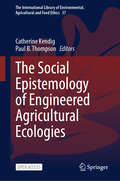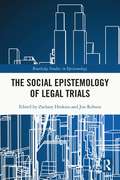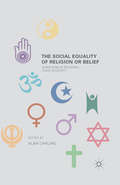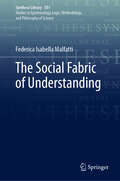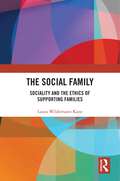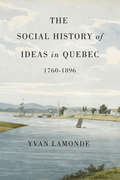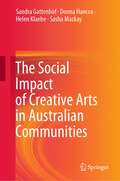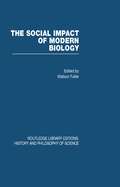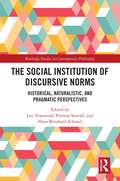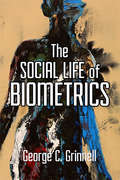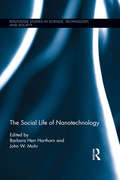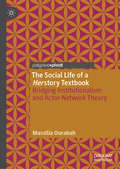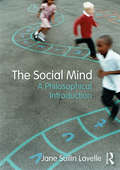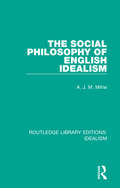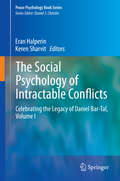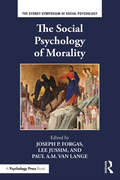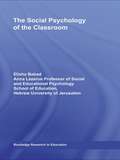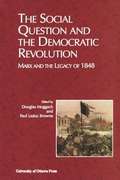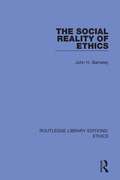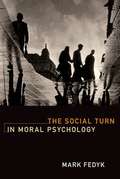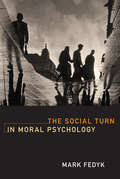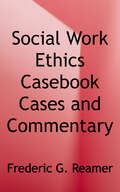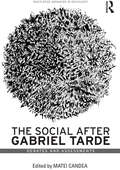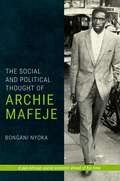- Table View
- List View
The Social Epistemology of Engineered Agricultural Ecologies (The International Library of Environmental, Agricultural and Food Ethics #37)
by Paul B. Thompson Catherine KendigThis open access collection of new interdisciplinary essays discusses philosophical and social implications of new biotechnologies, methods, and tools used in agriculture from a multispecies perspective. Contributors employ philosophy, sociology, and history of agriculture; agricultural ethics; philosophy of science; and science and technology studies to investigate agricultural research, farming practice, and agricultural policy. Chapters explore and critically discuss how mechanical, chemical, and genetic interventions reshape ecological relationships and agricultural knowledge by relying on case studies of interspecies interactions across different agriculturalized landscapes. These include careful examinations of the nature of dynamic causal relationships across microbial, macrobial, megaflora and faunal organismal communities; exploration of specific coevolved species of pollinators and field crops; and analyses of the epistemic and normative commitments that guide crop management decisions and shape methodological choices leading to the reengineering of land use. These analyses and case studies are intended to provide readers with a variety of conceptual tools through which the use of agricultural technologies might possibly be understood and debated.
The Social Epistemology of Legal Trials (Routledge Studies in Epistemology)
by Zachary Hoskins Jon RobsonThis collection is the first book-length examination of the various epistemological issues underlying legal trials. Trials are centrally concerned with determining truth: whether a criminal defendant has in fact culpably committed the act of which they are accused, or whether a civil defendant is in fact responsible for the damages alleged by the plaintiff. Truth is not, however, the only epistemic value which seems relevant to how trials proceed. We may think that a jury shouldn’t convict a defendant, even one who is as a matter of fact guilty, unless its members know or at least are justified in believing that the defendant committed the crime in question. Similarly, we might reasonably assume that the trier of fact must have some level of understanding to reach an adequate verdict in any case, but legitimate questions arise as to what level of understanding should be required. The essays collected in this volume consider a range of epistemological issues raised by trials, such as how much credence jurors should give to eyewitness testimony, the admissibility and role of statistical evidence, and the appropriate standards of proof in different contexts. The Social Epistemology of Legal Trials will be of interest to scholars and upper-level students working on issues at the intersection of epistemology and philosophy of law.
The Social Equality of Religion or Belief: A New View Of Religion's Place In Society
by Alan CarlingSome countries, like the UK, give special recognition by the state to one or a few religions; other countries, like France and the US, give recognition to none. This book is about a new approach that gives equal recognition to all religions and non-religious belief systems.
The Social Fabric of Understanding (Synthese Library #501)
by Federica Isabella MalfattiThis book is a journey of in-depth exploration into the social dimensions of understanding. As human beings, we strive to understand the world around us. The path to understanding, however, is rarely walked alone; we walk the path with others. We understand more together, by joining forces, than we would understand alone. When we understand something and come to see things clearly, it is probably because someone else has taught us, enlightened us, shared his or her perspective with us, or shaped our environment so that our attempts to make sense of the world were likely to succeed. Understanding, then, is a social rather than an individual achievement. The book will be of great interest to philosophers working in epistemology, philosophy of science, and the philosophy of education.
The Social Family: Sociality and the Ethics of Supporting Families
by Laura Wildemann KaneThis book argues for an inclusive definition of the family that recognizes diverse caregiving relationships and outlines distinct familial and governmental obligations based on a taxonomy of needs. In doing so, it de-emphasizes marriage, biological ties, or shared values as the basis for familial relationship in social and legal contexts.Author Laura Kane reconceives the family as a unique social group centered on providing intimate care for the mutual flourishing of all its members, regardless of gendered or intergenerational roles or relations. Adopting a care ethics framework, Kane argues that interdependent, intimate caregiving relationships are fundamental to human experience—without such relationships, many of us would encounter difficulties meeting our needs. This account therefore prioritizes families as the starting place for thinking through moral and political obligations, and advocates for state policies that support family caregiving relationships by granting rights, privileges, and protections to groups engaged in intimate, interdependent care.An important contribution to the philosophy of family structures and their role in society, The Social Family offers a clear and accessible account of its subject for researchers and students in philosophy, sociology, political theory, social work, family therapy, and those engaged in public policy.Key Features: Provides a clear definition of the family to ground family policy debates. Situates the family as a unique kind of social group through its purpose and commitment structure, contributing to debates in social ontology. Provides an account of the moral and social obligations of states to support families. Provides a more inclusive account of the family that disentangles marriage and procreation from family identity, reducing gendered role expectations within families.
The Social History of Ideas in Quebec, 1760-1896: Social History Of Ideas In Quebec, 1760-1896 (McGill-Queen's Studies in the History of Ideas #60)
by Yvan LamondeIn The Social History of Ideas in Quebec, 1760-1896, Yvan Lamonde traces the province's political and intellectual development from the British Conquest to the election of Prime Minister Wilfrid Laurier. From the individuals who formulated them, to the networks in which they circulated, to their reception, Yvan Lamonde focuses on ideas at work and their role in shaping Quebec history. The mapping of a complete intellectual circuit allows Lamonde to follow the strains of ideological debates - monarchism, liberalism, republicanism, democracy, revolution, ultramontanism, nationalism - over more than a century. His work is informed by an encyclopaedic reading of the print culture of the period and the book conveys a profound and nuanced knowledge of the social context and cultural channels - educational institutions, newspapers, the book trade - in which intellectual debate occurred. Lamonde argues that while these ideas concerned politics, they went beyond the political: they were a fundamental and everyday element of civic society that was expressed in the public sphere through pamphlets, the popular press, and sermons. Lamonde's scrutiny of public opinion in Quebec allows him to place such currents of thought in the colony's international context: that of France, England, Rome, the United States, and their respective metropolises. The Social History of Ideas in Quebec, 1760-1896 covers a volatile time in the province's history - from the end of the French Regime through the American invasion, the War of 1812, and the Rebellions in Lower Canada - capturing the cultural ascension of a society and the foundations of Quebec identity.
The Social Impact of Creative Arts in Australian Communities
by Sandra Gattenhof Donna Hancox Helen Klaebe Sasha MackayThis book brings together discussions about Australian arts policy and funding, outcomes of arts engagement in terms of social inclusion, well-being and education. It presents exemplars of creative programs or case studies that build capacity and lasting impact for communities in urban and regional Australia. This book describes the impact of the arts using narrative case studies. Through this, it develops conceptual understanding and frameworks that can be used to dynamically assess the value and impact of arts engagement across the three types of cultural value: intrinsic value, instrumental value and institutional value. It focuses on how arts engagement creates, supports and extends factors such as well-being, social inclusion and educational achievement. This book provides an innovative examination of the evidence from Australian projects depicting the impact of the arts on a range of indicators and sectors.
The Social Impact of Modern Biology (Routledge Library Editions: History & Philosophy of Science)
by Fuller WatsonOriginally published in 1971. Discoveries in modern biology can radically change human life as we know it. As our understanding of living processes, such as inheritance, grows, so do the possibilities of applying these results for good and evil, such as the treatment of disease, the control of ageing, behaviour and genetic engineering. These discoveries and their implications are discussed by some of the world’s leading biologists.
The Social Institution of Discursive Norms: Historical, Naturalistic, and Pragmatic Perspectives (Routledge Studies in Contemporary Philosophy)
by Hans Bernhard Schmid Preston Stovall Leo TownsendThe essays in this collection explore the idea that discursive norms—the norms governing our thought and talk—are profoundly social. Not only do these norms govern and structure our social interactions, but they are sustained by a variety of social and institutional structures. The chapters are divided into three thematic sections. The first offers historical perspectives on discursive norms, including a chapter by Robert Brandom on the way Hegel transformed Kant’s normativist approach to representation by adding both a social and a historicist dimension to it. Section II features four chapters that examine the sociality of normativity from within a broadly naturalistic framework. The third and final section focuses on the social dimension of linguistic phenomena such as online speech acts, oppressive speech, and assertions. The Social Institution of Discursive Norms will be of interest to scholars and advanced students working in philosophy of language, philosophy of mind, and social philosophy.
The Social Life of Biometrics
by George C GrinnellIn The Social Life of Biometrics, biometrics is loosely defined as a discrete technology of identification that associates physical features with a legal identity. Author George Grinnell considers the social and cultural life of biometrics by examining what it is asked to do, imagined to do, and its intended and unintended effects. As a human-focused account of technology, the book contends that biometrics needs to be understood as a mode of thought that informs how we live and understand one another; it is not simply a neutral technology of identification. Placing our biometric present in historical and cultural perspective, The Social Life of Biometrics examines a range of human experiences of biometrics. It features individual stories from locations as diverse as Turkey, Canada, Qatar, Six Nations territory in New York State, Iraq, the skies above New York City, a university campus and Nairobi to give cultural accounts of identification and look at the ongoing legacies of our biometric ambitions. It ends by considering the ethics surrounding biometrics and human identity, migration, movement, strangers, borders, and the nature of the body and its coherence. How has biometric thought structured ideas about borders, race, covered faces, migration, territory, citizenship, and international responsibility? What might happen if identity was less defined by the question of “who’s there?” and much more by the question “how do you live?”
The Social Life of Nanotechnology (Routledge Studies in Science, Technology and Society #18)
by Barbara Herr Harthorn John W. MohrThis book addresses the interconnections and tensions between technological development, the social benefits and risks of new technology, and the changing political economy of a global world system as they apply to the emerging field of nanotechnologies. The basic premise, developed throughout the volume, is that nanotechnologies have an undertheorized and often invisible social life that begins with their constructed origins and propels them around the globe, across multiple localities, institutions and collaborations, through diverse industries, research labs, and government agencies and into the public sphere. The volume situates nano innovation and development as a modernist science and technology project in a tense and unstable relationship with a fractured, postmodern social world. The book is unique in incorporating and integrating studies of innovation systems along with a focus on the risks and consequences of a globally significant set of emerging technologies. It does this by examining the social and political conditions of their creation, production, emergence, and reception.
The Social Life of a Herstory Textbook: Bridging Institutionalism and Actor-Network Theory
by Massilia OurabahThis book studies the possibility for feminist educational change by examining a case study on the social life of a French gender and women history textbook. Massilia Ourabah opens a unique and timely dialogue between two antagonistic sociological trends: institutionalism and actor-network theory (ANT), and more specifically the inhabited institution approach and the sociology of translation. The structure of the book is dual: it offers one version of the case study grounded in the institutionalist approach, and another version grounded in the translational approach. The goal is to show that through the introduction of institutional elements and the rejection of some of ANT’s strongest assumptions, the critical value of ANT can be restored and prove a useful framework for studying sociomaterial networks in education. The book also engages with feminist pedagogy and discusses the implications of the case study for the prospect of a more gender-balanced educational curriculum.
The Social Mind: A Philosophical Introduction
by Jane Suilin LavelleWe spend a lot of time thinking about other people: their motivations, what they are thinking, why they want particular things. Sometimes we are aware of it, but it often occurs without conscious thought, and we can respond appropriately to other people's thoughts in a diverse range of situations. The Social Mind: A Philosophical Introduction examines the cognitive capacities that facilitate this amazing ability. It explains and critiques key philosophical theories about how we think about other people's minds, measuring them against empirical findings from neuroscience, anthropology, developmental psychology and cognitive ethology.
The Social Philosophy of English Idealism (Routledge Library Editions: Idealism)
by A. J. MilneAt the turn of the century Idealism was perhaps the leading school of philosophy in the English-speaking world. By the 1960s the situation was very different. There had occurred during the previous two generations what has been described as ‘a revolution in philosophy’, one consequence of which had been the almost total eclipse of Idealism. Originally published in 1962, this book is a critical study of certain aspects of the work of four Idealist philosophers: F. H. Bradley, T. H. Green, Bernard Bosanquet and Josiah Royce. It deals mainly with their social philosophy, but some consideration is also given to their metaphysics. It is the thesis of this book that there is a valid and significant form of Idealism to be found in the work of these philosophers, but that they did not succeed in developing it fully and consistently.
The Social Psychology of Intractable Conflicts
by Eran Halperin Keren SharvitThis volume works explores a transferable theory of a specific social-psychological infrastructure, based on the work of Dr. Daniel Bar-Tal, that develops from cultures immersed in intractable conflicts. The book's approach to this issue is different from approaches that are predominant in social psychology. This is because an important inspiration of many scholars that contributed to the book is their everyday experience of living in a region where intractable conflict shapes the life's of everybody who lives there. On the basis of this experience and on the basis of extensive research, an elaborate theory of intractable conflict was developed that deals with the origin of such conflicts, the mechanisms that maintain them and the processes that may contribute to their peaceful solution. In light of recent research and developments, this volume demonstrates, analyzes and reviews the theory of a social-psychological infrastructure formed in societies with intractable conflicts. It explores the contents of these elements of the infrastructure, the processes through which they are acquired and maintained, their functions, the societal mechanisms that contribute to their institutionalization, as well as their role in the crystallization of social identity and development of a culture of conflict. By demonstrating that it can be applied to various kinds of intractable conflicts in various places of world, the volume argues that the theory is transferable and universal. Moreover, the volume aims to exhibit new connections and integrations between Bar-Tal's theories and other prominent theoretical frameworks in social and political psychology. Presenting both a comprehensive overview of works that have been influenced by Bar-Tal's theories and research, as well as a wide gate to future studies that will connect Bar-Tal's work to recent theoretical developments in related domains, Understanding the Social Psychology of Intractable Conflicts: Celebrating the Legacy of Daniel Bar Tal is an important text for all those interested in developing a sustainable, peaceful world.
The Social Psychology of Morality (Sydney Symposium of Social Psychology)
by Joseph P. Forgas Lee Jussim Paul A.M. Van LangeEver since Plato’s ‘Republic’ was written over two thousand years ago, one of the main concerns of social philosophy and later empirical social science was to understand the moral nature of human beings. The faculty to think and act in terms of overarching moral values is as much a defining hallmark of our species as is our intelligence, so homo moralis is no less an appropriate term to describe humans as homo sapiens. This volume makes a case for the pivotal role of social psychology as the core discipline for studying morality. The book is divided into four parts. First, the role of social psychological processes in moral values and judgments is discussed, followed by an analysis of the role of morality in interpersonal processes. The sometimes paradoxical, ironic effects of moral beliefs are described next, and in the final section the role of morality in collective and group behavior is considered. This book will be of interest to students and researchers in the social and behavioral sciences concerned with moral behavior, as well as professionals and practitioners in clinical, counseling, organizational, marketing and educational psychology where issues of ethics and morality are of importance.
The Social Psychology of the Classroom (Routledge Research In Education Ser.)
by Elisha BabadTeachers often find that their training has not provided them with sufficient knowledge and understanding about underlying social forces and processes in their classrooms. This new book addresses this gap by focusing on the social psychology of the classroom, providing the relevant social psychological knowledge and facilitating the application of
The Social Question and the Democratic Revolution: Marx and the Legacy of 1848
by Douglas Moggach Paul Leduc BrowneThe revolutionary movements of 1848 viewed the political cataclysm of continental Europe as an explosion of liberty, a new age of freedom and equality. This collection focuses on the relationship between democratic and socialist currents in 1848, seeking to reassess the relevance of these currents to the present era of global economic liberalism.
The Social Reality of Ethics
by John H. BarnsleyOriginally published in 1972, this book clarifies ‘ethical’ concepts such as ‘values’, ‘norms’ and ‘precepts’. It begins with a discussion of the conceptual problems faced by any inquiry into moral codes. The author looks in particular at the numerous ways of specifying the ‘moral’ component in human affairs and at the need for a definition appropriate to the requirements of social research. He then examines these questions from amore empirical viewpoint, and emphasis is put on the interplay between concepts and methods in social research. The important issues of ethical relativism and its relation to sociological inquiry is also raised. In this way, some of the possible ethical implications of sociology itself, both as an empirical discipline and as an organizing perspective, are critically examined.
The Social Turn in Moral Psychology
by Mark FedykIn this book, Mark Fedyk offers a novel analysis of the relationship between moral psychology and allied fields in the social sciences. Fedyk shows how the social sciences can be integrated with moral philosophy, argues for the benefits of such an integration, and offers a new ethical theory that can be used to bridge research between the two. Fedyk argues that moral psychology should take a social turn, investigating the psychological processes that motivate patterns of social behavior defined as ethical using normative information extracted from the social sciences. He points out methodological problems in conventional moral psychology, particularly the increasing methodological and conceptual inconsilience with both philosophical ethics and evolutionary biology. Fedyk's "causal theory of ethics" is designed to provide moral psychology with an ethical theory that can be used without creating tension between its scientific practice and the conceptual vocabulary of philosophical ethics. His account aims both to redirect moral psychology toward more socially realistic questions about human life and to introduce philosophers to a new form of ethical naturalism -- a way of thinking about how to use different fields of scientific research to answer some of the traditional questions that are at the heart of ethics.
The Social Turn in Moral Psychology (The\mit Press Ser.)
by Mark FedykAn argument that moral psychology can benefit from closer integration with the social sciences, offering a novel ethical theory bridging the two.In this book, Mark Fedyk offers a novel analysis of the relationship between moral psychology and allied fields in the social sciences. Fedyk shows how the social sciences can be integrated with moral philosophy, argues for the benefits of such an integration, and offers a new ethical theory that can be used to bridge research between the two. Fedyk argues that moral psychology should take a social turn, investigating the psychological processes that motivate patterns of social behavior defined as ethical using normative information extracted from the social sciences. He points out methodological problems in conventional moral psychology, particularly the increasing methodological and conceptual inconsilience with both philosophical ethics and evolutionary biology. Fedyk's “causal theory of ethics” is designed to provide moral psychology with an ethical theory that can be used without creating tension between its scientific practice and the conceptual vocabulary of philosophical ethics. His account aims both to redirect moral psychology toward more socially realistic questions about human life and to introduce philosophers to a new form of ethical naturalism—a way of thinking about how to use different fields of scientific research to answer some of the traditional questions that are at the heart of ethics.
The Social Work Ethics Casebook: Cases and Commentary
by Frederic G. ReamerThis is the first ethics casebook, including extensive cases and commentary, published exclusively for social workers. The book's realistic ethics cases provide a useful tool for rich discussion of ethical dilemmas and ethical decision making. Following each set of cases, Reamer includes commentary highlighting key ethics concepts and references to relevant standards in the NASW Code of Ethics. <p><p>The release of Social Work Ethics Casebook highlights ethical issues related to confidentiality and privacy, informed consent, client self-determination, professional paternalism, boundary issues and dual relationships, conflicts of interest, cultural and ethnic diversity, termination of services, administration, collegial impairment, commitments to employers, social work education and training, and more. Each section of the book also includes discussion questions designed to enhance readers understanding and application of important ethics concepts.
The Social World of Intellectuals in the Roman Empire
by Kendra Eshleman"This book examines the role of social networks in the formation of identity among sophists, philosophers, and Christians in the early Roman Empire. Membership in each category was established and evaluated socially as well as discursively. From clashes over admission to classrooms and communion to construction of the group's history, integration into the social fabric of the community served as both an index of identity and a medium through which contests over status and authority were conducted. The juxtaposition of patterns of belonging in Second Sophistic and early Christian circles reveals a shared repertoire of technologies of self-definition, authorization, and institutionalization, and shows how each group manipulated and adapted those strategies to its own needs. This approach provides a more rounded view of the Second Sophistic and places the early Christian formation of "orthodoxy" in a fresh context"--
The Social after Gabriel Tarde: Debates and Assessments (Routledge Advances in Sociology)
by Matei CandeaGabriel Tarde was a highly influential figure in 19th century French sociology: a prolific and evocative writer whose understanding of the social differed radically from that of his younger opponent Emile Durkheim. Whereas Durkheimian sociology went on to become the core of the social scientific canon throughout much of the 20th century, Tarde’s sociology fell out of the picture, and he was remembered mostly through a few footnotes in which Durkheim dismissed him as an individualist, a psychologist and a metaphysician. The social sciences and humanities are now being swept by a Tardean revival, a rediscovery and reappraisal of the work of this truly unique thinker, for whom ‘every thing is a society and every science a sociology’. Tarde is being brought forward as the misrecognised forerunner of a post-Durkheimian era. Reclaimed from a century of near-oblivion, his sociology has been linked to Foucaultian microphysics of power, to Deleuze's philosophy of difference, and most recently to the spectrum of approaches related to Actor Network Theory. In this connection, Bruno Latour hailed Tarde’s sociology as "an alternative beginning for an alternative social science". This volume asks what such an alternative social science might look like. This second edition has been expanded to include, alongside the original chapters, two key essays by Gabriel Tarde himself - Monadology and Sociology and The Two Elements of Sociology, as well as a significantly revised and extended introduction by the editor.
The Social and Political Thought of Archie Mafeje
by Dr. Bongani NyokaThis comprehensive treatment of Archie Mafeje as a thinker and researcher analyses his overall scholarship and his role as a theoretician of liberation and revolutionary theorySocial scientist Archie Mafeje, who was born in the Eastern Cape but lived most of his scholarly life in exile, was one of Africa's most prominent intellectuals. This ground-breaking work is the first of its kind to consider the entire body of Mafeje’s oeuvre and offers a much-needed engagement with his ideas. The most inclusive and critical treatment to date of Mafeje as a thinker and researcher, the book analyses his overall scholarship and his role as a theoretician of liberation and revolution. Author Bongani Nyoka's main argument is that Mafeje’s superb scholarship developed out of his experience as an oppressed black person and his early political education, which merged with his university training to turn him into a formidable cutting-edge intellectual force. There are three main parts to the book. Part I evaluates Mafeje's critique of the social sciences, part II focuses on his work on land and agrarian issues in sub-Saharan Africa and part III deals with his work on revolutionary theory and politics. The book engages in the act of knowledge decolonisation, making a unique contribution to South Africa’s sociological, historical and political studies.
